Big Boots Matter
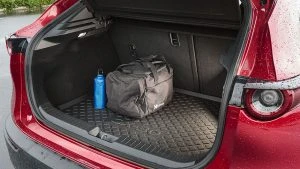
Luggage Space
If size matters to you when it comes to what you can (or can’t) fit in your boot, then how much space is commonly available in popular new car buys? The chances are you’ll want to know, so first are some of the most popular vehicles bought in Australia and their boot volume (litres). All the vehicles listed have their rear seats in place, because we all know the greatest vehicles carry a decent amount of luggage without having to flip their rear seats flat. There’s nothing worse than telling little Johnny that he can’t travel with his mates because the split folding rear seats have been split folded to take the school camp food!
At the end is a list of the best picks for carrying 550 litres or more behind the rear seats. You might be surprised, or not…
Supermini
Average boot space: 340.88 litres
1/ Renault Clio – 395 litres
2/ Honda Jazz – 354 litres
3/ Volkswagen Polo – 351 litres
Audi A1 – 335 litres
Skoda Fabia – 330 litres
Hyundai i20 – 326 litres
Kia Rio – 325 litres
Peugeot 208 – 311 litres
Hatchbacks
Average boot space: 479.40 litres
1/ Skoda Octavia 590 litres
2/ Peugeot 308 501 litres
3/ Honda Civic 492 litres
Renault Megane 434
VW Golf 380 litres
Small 4-door sedan
Average boot space: 464.75 litres
1/ Honda City | 536 litres
2/ Honda Civic | 519 litres
3/ Renault Megane | 503 litres
Kia Cerato | 502 litres
Toyota Corolla | 470 litres
Hyundai Accent Sport | 465 litres
Hyundai Elantra | 458 litres
Holden Astra | 445 litres
Mazda 3 444 litres
Audi A3 | 425 litres
Mazda 2 410 litres
Mitsubishi Lancer | 400 litres
Medium 4-Door Sedan
Average boot space: 501.82 litres
1/ Volkswagen Passat | 586 litres
2/ Skoda Octavia | 568 litres
3/ Toyota Camry | 524 litres
Kia Optima | 510 litres
Hyundai Sonata | 510 litres
Subaru Liberty | 493 litres
BMW 3 Series | 480 litres
Mazda 6 | 474 litres
Subaru Impreza | 460 litres
Ford Mondeo | 458 litres
Honda Accord | 457 litres
Large 4-Door Sedan
Average boot space: 509.2 litres
1/ Skoda Superb | 625 litres
2/ Volkswagen Arteon | 563 litres
3/ Holden Commodore | 490 litres
Chrysler 300 | 462 litres
Kia Stinger | 406 litres
Station wagons
Average boot space: 560.9 litres
1/ Holden Sportwagon 895 litres
2/ Skoda Superb 660 litres
3/ Peugeot 308 SW 660 litres
Ford Focus SW 608 litres
VW Golf SW 605 litres
Hyundai i30 SW 602 litres
Audi A6 SW 586 litres
Volvo V70 575 litres
BMW 5-Series SW 570 litres
Jaguar XF SW 565 litres
Kia Optima SW 552 litres
Ford Mondeo 541 litres
Mercedes Benz E-Class 540 litres
Subaru Levorg 522 litres
Mazda 6 SW 522 litres
Renault Megane SW 521 litres
Subaru Outback 512 litres
Peugeot 407 430 litres
Toyota Corolla SW 392 litres
Mini Clubman SW 360 litres
SUVs
LIGHT SUVs
Average boot space: 346.2 litres
1/ Citroen C3 Aircross – 410 litres
2/ Holden Trax – 356 litres
3/ Hyundai Venue 355 litres
Ford EcoSport – 346 litres
Mazda CX-3 264 litres
SMALL SUVs
Average boot space: 385.91 litres
1/ Jeep Compass 438 litres
2/ Honda HR-V 437 litres
3/ Kia Seltos 433 litres
Nissan Qashqai 430 litres
Renault Kadjar 408 litres
Mitsubishi ASX 393 litres
Toyota C-HR 377 litres
Hyundai Kona 361 litres
Mitsubishi Eclipse Cross 341 litres
Mazda CX-30 317 litres
Subaru XV 310 litres
MEDIUM SUVs
Average boot space: 496.67 litres
1/ Volkswagen Tiguan 615 litres
2/ Toyota RAV4 580 litres
3/ Nissan X-Trail 565 litres
Honda CR-V 522 litres
Subaru Forester 498 litres
Hyundai Tucson 488 litres
Mitsubishi Outlander 477 litres
MG HS 463 litres
Renault Koleos 458 litres
Kia Sportage 446 litres
Mazda CX-5 442 litres
Ford Escape 406 litres
LARGE SUVs
Average boot space: 669.50 litres
1/ Holden Acadia 1042 litres
2/ Holden Equinox 846 litres
3/ Mazda CX-9 810 litres
Toyota LandCruiser Prado 620 litres
Hyundai Santa Fe 547 litres
Toyota Kluger 529 litres
Subaru Outback 512 litres
Ford Everest 450 litres
Keep in mind that most vehicles we buy now do have split folding rear seats, so when we don’t have to carry passengers we can make use of the rear seat space in exchange for carrying cargo/luggage. Many of us don’t want to have to use the rear seat space for luggage; often the back seats are occupied with passengers anyway, so the vehicles that provide over 500 litres behind the back seats are going to be the ones that offer excellent luggage space.
If we look at averages alone, the Large SUV is easily king for luggage carrying duties. Most are seven-seater SUVs, too; but make it just the 5 seats, and they can only be a win/win combination. The next step up would be a van!
However, both the Station Wagon and Large sedan are other excellent options for you to go to for decent luggage carrying ability. Even the Medium Sedan offers some cars that provide excellent big boots: the Volkswagen Passat (586 litres), Skoda Octavia (568 litres) and the Toyota Camry (524 litres) are the best examples.
One thing that did surprise me was that the boot space in a small SUV isn’t much to write home about; its average for the class being a dismal 385.91 litres. This dropped to an abysmal 346.2 litres for light SUVs. These vehicles, and smaller are best avoided if decent boot space is what you need.
Any vehicle that can offer at least 550 litres of luggage space in the boot without having to fold down any of the rear seats is a winner for cargo carriers. If you are looking for a vehicle (that isn’t a van) that will deliver good boot space (550 litres or more) for things like: school bags, computer equipment, sport gear, holiday luggage etc., then you’ll probably need one of the following vehicles:
Hatchback:
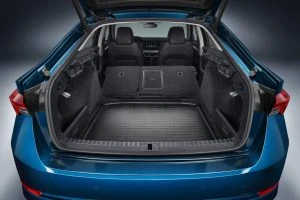
Skoda Octavia Hatchback
Skoda Octavia Hatchback 590 litres
Medium 4-dr Sedan:
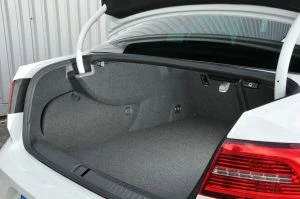
VW Passat Sedan
Volkswagen Passat 586 litres
Skoda Octavia 568 litres
Large 4-dr Sedan
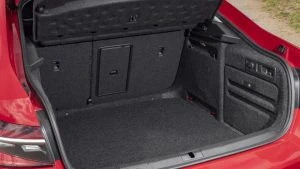
Skoda Superb Sedan/Hatch
Skoda Superb 625 litres
Volkswagen Arteon 563 litres
Station Wagon

Holden Commodore Sportwagon
Holden Sportwagon 895 litres
Skoda Superb 660 litres
Peugeot 308 660 litres
Ford Focus 608 litres
VW Golf 605 litres
Hyundai i30 602 litres
Audi A6 586 litres
Volvo V70 575 litres
BMW 5-Series 570 litres
Jaguar XF 565 litres
Kia Optima 552 litres
Medium SUV
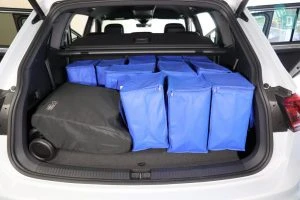
VW Tiguan SUV
Volkswagen Tiguan 615 litres
Toyota RAV4 580 litres
Nissan X-Trail 565 litres
Large SUV
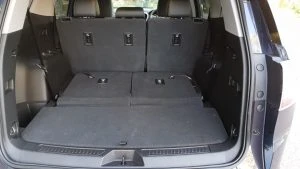
Holden Acadia 7-seater
Holden Acadia 1042 litres
Holden Equinox 846 litres
Mazda CX-9 810 litres
Toyota LandCruiser Prado 620 litres
Hyundai Santa Fe 547 litres